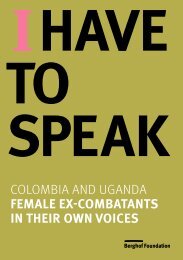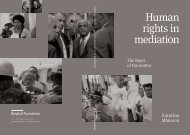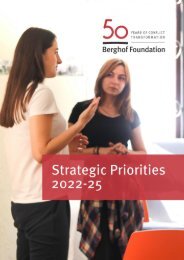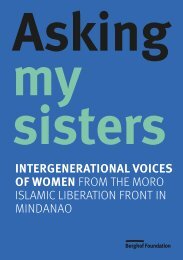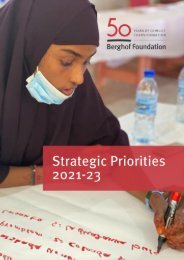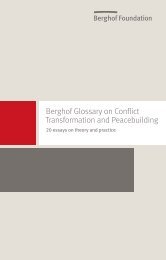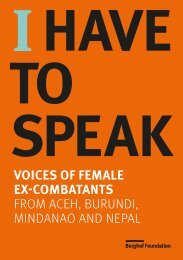Berghof Foundation: 50 years of conflict transformation
This book provides an overview of the Berghof Foundation’s work and impact over the past 50 years and sheds light on the challenges ahead of peacebuilding.
This book provides an overview of the Berghof Foundation’s work and impact over the past 50 years and sheds light on the challenges ahead of peacebuilding.
Create successful ePaper yourself
Turn your PDF publications into a flip-book with our unique Google optimized e-Paper software.
The <strong>Bergh<strong>of</strong></strong><br />
Handbook<br />
for Conflict<br />
Transformation<br />
As the <strong>Bergh<strong>of</strong></strong> <strong>Foundation</strong> turns <strong>50</strong>, its publication <strong>of</strong><br />
longest standing looks back at its own anniversary:<br />
2021 marks 20 <strong>years</strong> since the first articles were<br />
published in the <strong>Bergh<strong>of</strong></strong> Handbook for Conflict<br />
Transformation. The web-based knowledge platform<br />
has grown, over the <strong>years</strong>, into a globally recognised<br />
and widely acclaimed one-stop shop for innovative<br />
knowledge and critical/constructive debate on how to<br />
turn <strong>conflict</strong> <strong>transformation</strong> from theory into practice.<br />
Today, the continually expanding free online<br />
platform hosts nearly 1<strong>50</strong> articles (56 <strong>of</strong> which are<br />
in English, the remaining being translations into<br />
Arabic, German, Tamil, Russian, Sinhala, Spanish<br />
and Turkish). Key works are captured in two edited<br />
volumes (Transforming Ethnopolitical Conflict<br />
and Advancing Conflict Transformation, <strong>Bergh<strong>of</strong></strong><br />
Handbook I and II). In addition, there is the <strong>Bergh<strong>of</strong></strong><br />
Handbook Dialogue Series with 13 issues so far —<br />
exchanges between scholars and practitioners from<br />
different disciplines and world regions on some<br />
<strong>of</strong> the thorniest issues and dilemmas in <strong>conflict</strong><br />
<strong>transformation</strong> and peacebuilding. They range from<br />
”<br />
[It] will be looked<br />
back upon thirty<br />
<strong>years</strong> from now as a<br />
foundational account<br />
<strong>of</strong> the field. I plan to<br />
keep it close at hand.<br />
John Paul Lederach<br />
Peace and Conflict Impact Assessment (Issue no. 1)<br />
to, most recently, Transforming Violent Extremism<br />
(Issue no. 13).<br />
At its inception, the Handbook benefited<br />
from generous funding from the German Federal<br />
Ministry <strong>of</strong> Education and Research in the late 1990s.<br />
In later <strong>years</strong>, indeed decades, the continuation<br />
<strong>of</strong> the Handbook has been one <strong>of</strong> the investments<br />
made by the <strong>Bergh<strong>of</strong></strong> <strong>Foundation</strong> from its core funds<br />
in response to unbroken demand. Its guiding idea<br />
remains to present the evolving state <strong>of</strong> the art in<br />
<strong>conflict</strong> <strong>transformation</strong> and peacebuilding in one<br />
place — accessible and informative for scholars,<br />
students, practitioners and policy-makers in search<br />
<strong>of</strong> conceptual frameworks, impact stories and<br />
lessons learned from the field.<br />
The impact <strong>of</strong> this flagship publication,<br />
both in terms <strong>of</strong> providing a valuable service to<br />
peacebuilders around the world and in putting<br />
the <strong>Bergh<strong>of</strong></strong> <strong>Foundation</strong> and its predecessor<br />
institutes firmly on the map <strong>of</strong> international <strong>conflict</strong><br />
<strong>transformation</strong>, is evident both anecdotally and in<br />
numbers. Download numbers remain high, averaging<br />
well over 1<strong>50</strong>,000 per year, and not counting the<br />
numerous sister sites where <strong>Bergh<strong>of</strong></strong> Handbook<br />
articles are available. “<strong>Bergh<strong>of</strong></strong> publications continue<br />
to journey with me wherever I go,” writes one <strong>of</strong><br />
our previous authors a good 10 <strong>years</strong> after first<br />
publishing with us. Indeed, we have happened to<br />
come across the blue books on shelves and in training<br />
courses as far afield as South Sudan, Afghanistan<br />
and India. Handbook articles appear on course<br />
syllabi and reading lists at many universities and<br />
across numerous disciplines. Indeed, one Peace<br />
Studies course in Germany was entirely constructed<br />
around the <strong>Bergh<strong>of</strong></strong> Handbook Dialogue Series, with<br />
students’ assignments being to produce additional<br />
commentaries on the content <strong>of</strong> the series.<br />
Reviews throughout the <strong>years</strong> attest that<br />
the <strong>Bergh<strong>of</strong></strong> Handbook for Conflict Transformation<br />
“truly manages to fill a gap connecting theory<br />
with practice” and “systematically charts and<br />
consolidates our knowledge.” It has been called “very<br />
productive” and “skilfully crafted.” In his foreword<br />
to the second print edition, the doyen <strong>of</strong> <strong>conflict</strong><br />
<strong>transformation</strong> John Paul Lederach wrote that it “has<br />
integrated three decades <strong>of</strong> practice and theory and<br />
will be looked back upon thirty <strong>years</strong> from now as<br />
a foundational account <strong>of</strong> the field. I plan to keep it<br />
close at hand.”<br />
With such encouragement from scholars<br />
and practitioners alike, we embark into our sixth<br />
decade with unwavering commitment. New or ever<br />
more pressing strategic “nexus” topics present<br />
themselves for exploration: How will <strong>conflict</strong><br />
<strong>transformation</strong> adapt to climate change conditions?<br />
What distinguishes transformative approaches<br />
to supporting good governance and tackling<br />
corruption? How can inclusive historical narratives<br />
be forged amidst contestation and polarisation?<br />
How will the Western proponents <strong>of</strong> peacebuilding<br />
manage to ‘bring peacebuilding home’ to their own<br />
communities? What rights-based system(s) <strong>of</strong> order<br />
will emerge from what, in 2021, looks like the ashes<br />
<strong>of</strong> many old certainties and an emerging multi-polar<br />
world disorder, and how will <strong>conflict</strong> <strong>transformation</strong><br />
work in this new context?<br />
2001–present<br />
38<br />
39




